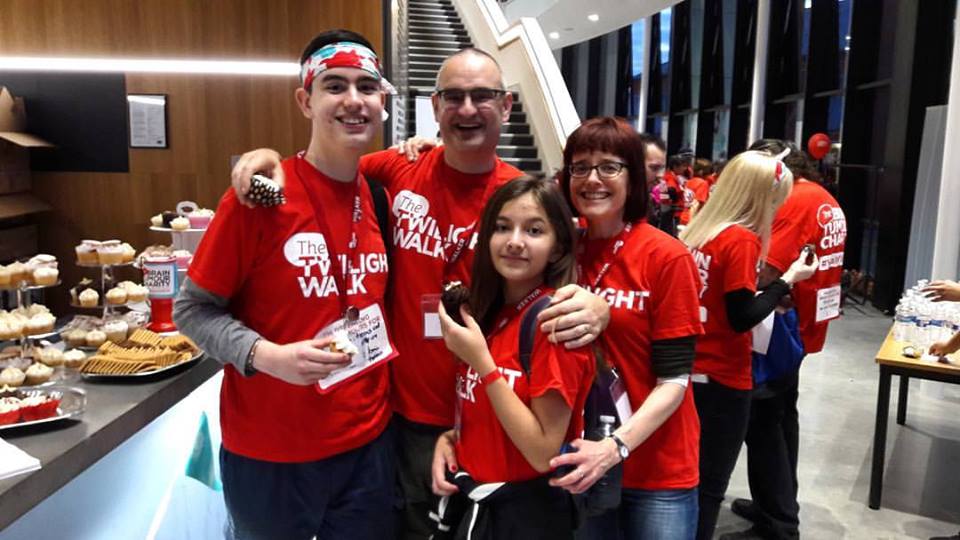News
-

The Lewis Moody Foundation raises over £1million for people affected by brain tumours
The milestone galvanises the drive for support and research into brain tumours
-

Less Survivable Cancer Taskforce doubling survivable statement
Today sees the launch of the Less Survivable Cancer Taskforce’s campaign to double five-year survival for each of the six less survivable cancers
-

Our partnership with BECG
We are delighted to announce that Built Environment Communications Group (BECG) have chosen The Brain Tumour Charity as their charity of the year.
-

The Copping’s story – walking for a cure
My youngest son James was diagnosed with a brain tumour in 2014 when he was just three years old.
-

My benefits experience
A guest blog from Jason about his struggle to get the benefits he is entitled to after being diagnosed with an Astrocytoma brain tumour.
-

Keeping cool in the heat
If a heatwave leaves you wishing you could switch your beach umbrella for your rain brolly, you’re not alone. So, we’ve put together our seven top tips to keep cool in the heat.
-

Outpatient appointments – what to bring and how to prepare
A guest blog from 17 year old Kaleb about what to bring and how to prepare for a day care medical appointment.
-

Enjoy a long weekend your way
As we come to one of the last bank holidays of the year, it’s time to make the most of it and enjoy the summer season!
-

Scientists discover a chemical that can kill glioblastoma cells
Laboratory experiments show that a synthetic chemical is able to shut off glioblastoma cells’ energy source, leading to cell death
-

The Brain Tumour Charity submits DCVax®-L consultation response
This week The Charity submitted its patient organisation consultation response about the potentially-groundbreaking new treatment DCVax®-L.
-

Blue Apple Partnership
We are delighted to announce that Blue Apple have chosen The Brain Tumour Charity as their charity of the year.
-

Daily life in the school holidays
We are excited to share a vlog from Penelope Hart-Spencer, who is a Health Play Specialist.
-

Travel insurance for children with a brain tumour
A specialist travel insurance provider answers your questions on travel insurance for a child with a brain tumour.
-

Holidays and breaks for families with a brain tumour
The first in our series of virtual information events for parents and carers of a child with a brain tumour.
-

National Cancer Patient Experience Survey (NCPES)
Last Friday (27th July), the findings of the National Cancer Patient Experience Survey 2017 (NCPES) were published.
-

Parental Bereavement (Leave and Pay) Bill passes final Parliamentary hurdle
The Parental Bereavement (Leave and Pay) Bill has just passed its third reading in the House of Lords and is expected to come into force in April 2020.
-

The Brain Tumour Charity finalist for Charity of the Year – Third Sector Awards
We are delighted to be finalists for Charity of the Year, Annual Report and Fundraising Event for the Third Sector Awards.
-

Developments for the European Medicines Agency
On Tuesday night, MPs in Westminster adopted an amendment to the Trade Bill which indicates support for the United Kingdom remaining in the regulatory framework of the European Medicines Agency (EMA)
-

The International Symposium on Paediatric Neuro-oncology
Our Research Communications Assistant, Arshiya, gives an overview of the International Symposium on Paediatric Neuro-Oncology (ISPNO)
-

The new NICE guidelines entitled ‘Brain tumours (primary) and brain metastases in adults’
These guidelines, published today, have been updated for the first time in over a decade
-

Different cell types work together to drive tumour spread in paediatric high-grade gliomas
Researchers from the Institute of Cancer Research discovered that tumour cells in paediatric high-grade gliomas work together to invade other structures of the brain
-

Celebrating the 70th birthday of the NHS
Today marks the 70th birthday of the National Health Service and The Brain Tumour Charity would like to celebrate all that it has done for our community
-

Could the polio virus help treat brain cancer?
Results from a phase 1 clinical trial show that patients with recurrent glioblastoma treated with an inactive version of the polio virus live longer than those receiving standard treatment
-

Positive results from a drug treating recurrent glioblastoma
New data presented at the recent American Association of Clinical Oncology (ASCO) meeting in Chicago by Abbvie, a pharmaceutical company, provides hope for those diagnosed with a glioblastoma